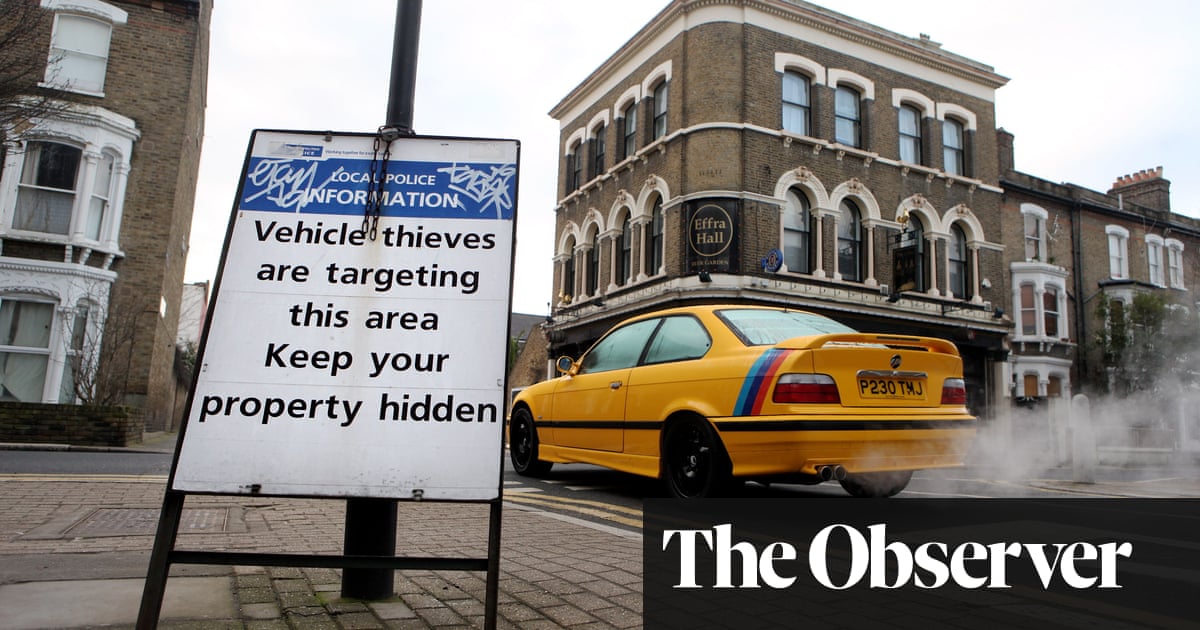
Police failed to catch any criminals who stole a car in more than 100 neighbourhoods across England and Wales last year, analysis by the Observer has revealed.
A further 558 neighbourhoods with an average of at least one vehicle crime a week saw less than 2% solved, with a suspect caught and charged, according to figures published on data.police.uk, a site for open data on crime and policing.
In total, about 336,000 vehicle crimes across England and Wales, which includes thefts and break-ins, were closed without a suspect being identified – approximately 85% of all vehicle offences recorded. In some cases, police closed investigations into car theft in less than 24 hours.
The Observer revealed last month the car industry was warned more than a decade ago vehicles with keyless ignition risked a surge in thefts.
Mike Briggs, president of the UK branch of the International Association of Auto Theft Investigators, said police did not have the resources to investigate and detect the current level of vehicle crime. He said: “The thieves now have the technology to beat the security systems and the police are on the back foot.”
He said it was a concern that under EU laws a vehicle’s software systems are “readily accessible”. He added: “It is like building a fortress and giving away the front door key.” Briggs also said that police needed better training to detect the sophisticated technology often used in car crime.
Among the most common tactics are “relay attacks” in which a device is used to amplify the signal of a key fob in an owner’s home. The signal is then used to gain entry to the car and start it. There are also certain devices that can mimic the electronic key on some vehicles, opening the doors and starting the engine.
The figures exclude Greater Manchester and Devon and Cornwall forces because of police information technology problems.
Of the areas where no vehicle crimes were solved, Blyth in Bassetlaw, Nottinghamshire, had the highest rate of offences, with all 126 vehicle crimes closed without a prosecution in the year to September 2023 – 54 for every 1,000 residents.
It was followed by the Courtfield ward in the London borough of Kensington and Chelsea (26 vehicle crimes for every 1,000 people), the villages of Awsworth, Cossall and Trowell in Broxtowe, Nottinghamshire (23 for every 1,000 people), and Chichester Central (21 for every 1,000 people).
The ward with the highest total vehicle crime was the West End in London’s Westminster, with 1,171 – 98% of which failed to result in a prosecution.
It was followed by Birmingham’s Ladywood ward (989 vehicle crimes), the Heathrow Villages ward in west London (913) and West Thurrock and South Stifford ward in Essex, with (797).
While overall vehicle crime has fallen significantly in recent years, car thefts are at their highest for a decade, up more than 50% from 85,803 vehicles in the year to March 2012 to 130,270 in the year to March 2023 .
The rise in vehicle crime has also fuelled high costs for car insurance. The average UK premium was a record £995 in the final quarter of last year, according to price comparison website Confused.com and insurance broker Willis Towers Watson.
The Association of British Insurers says it is working with the industry to “understand areas of shared concern”.
AA insurance services says a greater police effort is required to combat thieves deploying hi-tech methods to overcome security systems.
Managing director Gus Park has urged police chiefs and crime commissioners to develop an action plan, warning the vehicle theft figures “are in danger of getting out of control”.The proportion of car thefts that result in a charge in the year to September 2023 was just 0.9% for the Metropolitan police, the lowest charge rate out of all police forces in England and Wales.
A Home Office spokesperson said: “We expect police to take vehicle crime seriously and investigate thoroughly, to ensure perpetrators are charged and brought to justice, which is why we welcomed the commitment made by police in August last year to follow up on all reasonable lines of enquiry. Progress has been made in tackling vehicle-related theft, which is down 18% since 2010. We have also recently introduced provisions in the criminal justice bill to ban electronic devices used in vehicle theft.”












